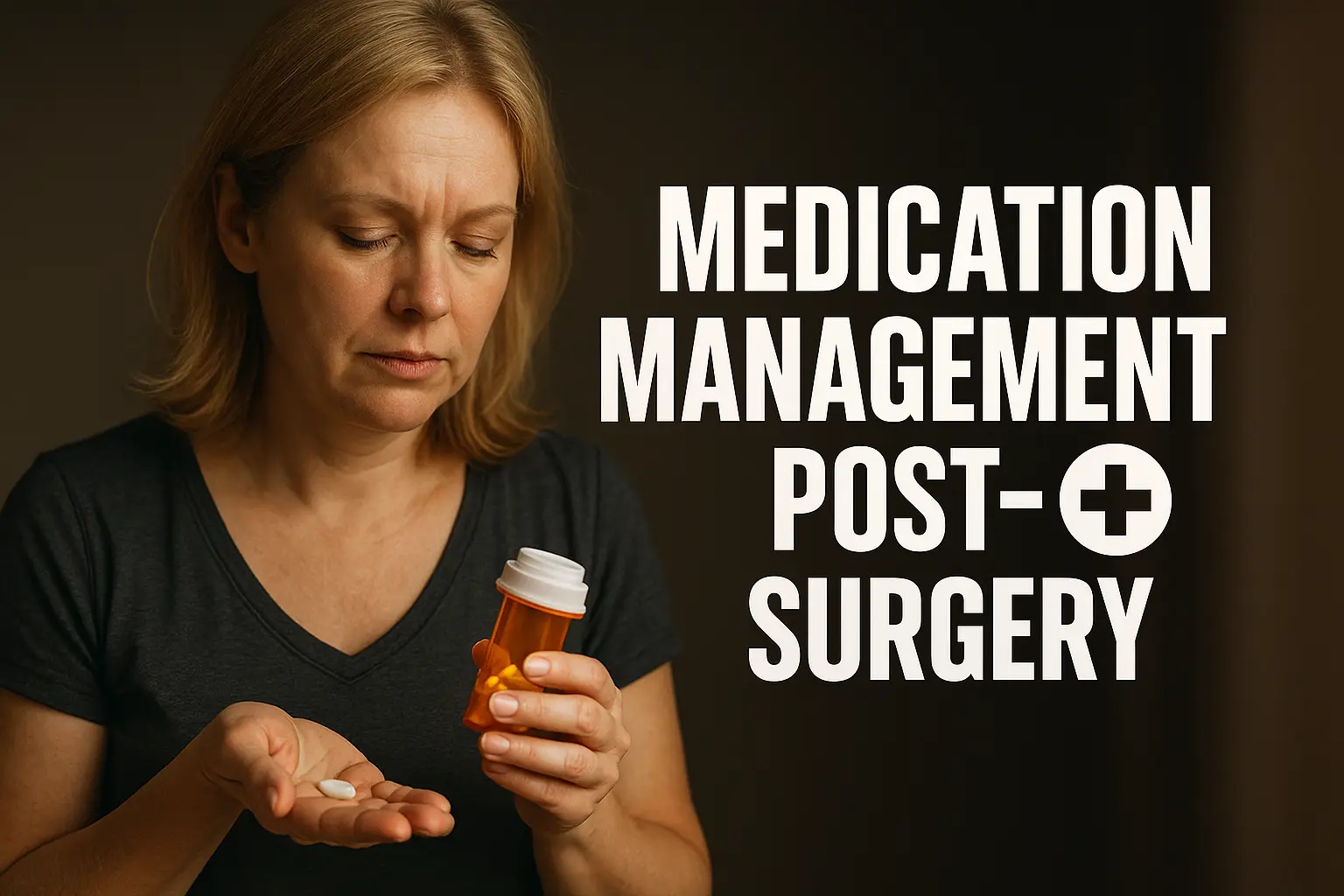More than just resting, after surgery, you need to carefully and regularly take all your prescribed drugs. How medication is managed is essential for a patient’s recovery and prevents unnecessary complications after surgery. A smooth recovery depends a lot on how well post-surgical medications are managed which anyone caring for a patient may find useful. This blog explores how to handle medication management post-surgery. Our experience as a home health care service provider reveals how to manage your drugs after surgery, explains why it is important and introduces helpful methods and ideas for yourself or your caregiver.
Step-by-Step Guide to Handle Medication Management Post-Surgery
Recovering after surgery often needs taking pain, infection, blood thinning and other medications. Caring for all these drugs at once can be very daunting. The following section shows each step you can take to fix it.
Understand Your Prescription Instructions
The key first step is making sure you know what every medication is used for and the best way to use it. Typically, after surgery, patients get a list of medicines they can buy. Mistakes happen when instructions are not clear. Always make sure to ask the person handling your discharge these questions:
- What is the purpose of each medication
- What is the correct dosage and frequency?
- Should it be taken with food or on an empty stomach?
- Are there any possible side effects or interactions?
If you care for the elderly, make notes and encourage them to know how the medications should be used.
Set Up a Medication Schedule
When you understand how the care plan works, the following step is to make a medication schedule. Many prescriptions are written to be taken at specific times of the day. A set and regular schedule lowers the risk of people overshooting or skipping their medication intake. To put a schedule together:
- Try using a copy of a printed chart or calendar.
- Put reminders into your phone as alarms.
- Install apps that will remind you to take your medicine at the proper time.
Take the medication at the same time as you have meals or perform your daily activities.
A regular day could be set up like this:
| Time | Medication | Dosage | Notes |
|---|---|---|---|
| 8:00 AM | Pain reliever | 1 Tablet | With food |
| 12:00 PM | Antibiotic | 1 Capsule | Empty stomach |
| 6:00 PM | Blood thinner | 1 Tablet | Avoid with certain foods |
| 10:00 PM | Pain reliever | 1 Tablet | Optional if no pain |
Having this visual guide can be very helpful to someone recovering at home.
Involve a Caregiver or Family Member
Even highly organized patients may find it hard to keep up with their medications, mainly because they feel very tired and sluggish after surgery. Having a caregiver can make sure that the treatment is followed correctly.
Caregivers can:
- Make sure you know the times for each medicine prescription.
- Assist with getting or distributing medications for patients.
- Pay attention to symptoms and any side effects after the procedure.
- Don’t wait too long to get new prescriptions.
- Talk to your doctor if something is worrying you.
Checking in with a friend every day can greatly improve following medication instructions. Help prepare or administer medications.
Monitor for Side Effects
Taking any medicine increases your chances of experience certain side effects. Constantly monitor the patient and communicate any atypical signs or behaviors. Side effects that many people report are:
- Nausea
- Dizziness
- Sleepiness or insomnia
- Constipation or diarrhea
- Allergic reactions (rash, swelling, itching)
Difficulty in breathing, chest pain or being confused are signs that require medical help right away. Make a list of the symptoms you experience and take it with you to the appointment.
Why Medication Management Is Crucial After Surgery?
he answer is: why does any of this matter? Because patients recover slowly after surgery, proper handling of medications is very important to avoid serious risks.
The Risks of Missed Doses or Incorrect Usage
Missing a dose could be dangerous in the days following surgery. Just a few risks are mentioned here:
- Pain can get much worse when the patient misses pain medication which makes it difficult for them to sleep or move around.
- Skipping antibiotics or quitting too soon may cause a serious infection that needs another hospital visit to address.
- Missing even a single pill of a blood thinner might cause blood clot formation.
- Drug-drug interactions can take place if the right dosing schedule is not maintained.
It’s not an option to be inconsistent to be effective.
The Role of Proper Medication in Recovery
It is not just the pain that good medication treats. It works to repair the body, stop problems and allow patients to get back to their normal lives as soon as possible. Here’s how:
- Proper pain management gives you more ease and lowers the risk of more injuries.
- Using anti-inflammatories can help control inflammation and help your tissues heal.
- Antibiotics help stop infections at risk areas like surgical incisions.
- Help district bone or tissue wounds in some surgical treatments.
- Managing medications helps patients regain health quickly, prevent many complications and maintain control of their condition.
Tools and Resources for Post-Surgical Medication Management
It is not necessary to handle medication management alone. Numerous services and tools are available to aid in simplifying the process. The best resources for assisting with post-operative medication regimens are listed below.
- Pill organizers: Daily or weekly pillboxes can make complicated routines easier.
- Boxes with color coding can make things even simpler.
- Mobile apps: These apps such as Medisafe, MyTherapy or CareZone provide sharing capabilities logs and reminders to keep caregivers informed.
- Medication checklists: Caregivers can mark off prescriptions as they are taken using printed charts or templates.
Combining different tools guarantees that no medication is overlooked or confused.
Tips for Caregivers Managing Medication Post-Surgery
Your role is crucial if you are a carer. As a member of a recovery team, you’re doing more than just giving out pills. Here’s how to continue being proactive and organized:
Organise Prescriptions Effectively
Keep everything in one place, and manage a “medication station” in the home. This might include a tray or bin with all prescriptions, a copy of the current medication list, pill cutters or crushing tools (if approved by a doctor), and a logbook or app to track doses and symptoms. Use folders or binders to store prescriptions, discharge papers, and medical notes. This will also help during follow-ups.
Coordinating with Healthcare Professionals
Keep transparent communication with professionals of healthcare. Stay in touch with the surgeon, primary care physician, pharmacist, physical therapist if required. Keep updated all professionals are aware of the current medication list. Bring a printed or digital copy to appointments, and update it after every change.
Conclusion
Handle Medication Management Post-Surgery: Recuperation after surgery is more than just dressing wounds it’s also about taking your drugs as prescribed to promote internal healing. It is not necessary for medication management to be overwhelming if there is a clear plan, useful tools, and a caring caregiver. Precious Pearls Health Home Care is available to assist you or a loved one with post-operative medication management. Our skilled caregivers help you concentrate on what truly matters—healing, by making sure that medications are taken accurately and on schedule. Contact us right now and well deliver expert caring care to your door.
FAQs
Can I drive while on post-surgery medication?
Depending on the drug yes, numerous sedatives and painkillers affect alertness and response time.
How long will I need pain meds after surgery?
Pain medication is typically taken for a few days to a few weeks depending on the type of surgery and degree of pain. As you get better your doctor will gradually lower the dosage.
What if I miss a dose?
Unless it’s almost time for the next dose, take it as soon as you remember. If so, omit the missed dosage. Avoid doing so without first consulting a doctor.






